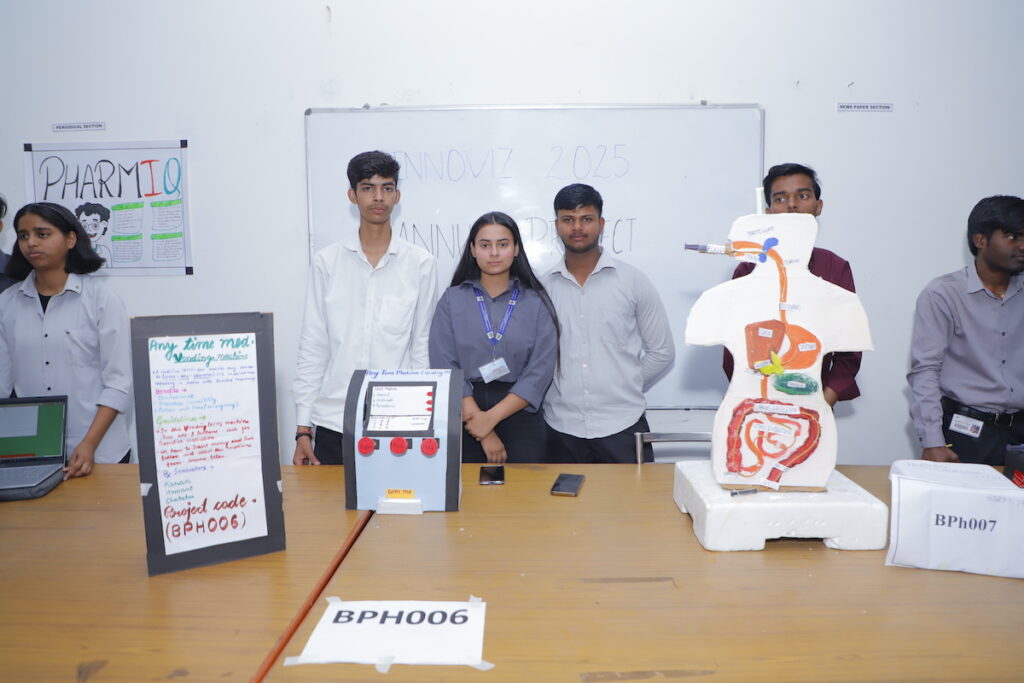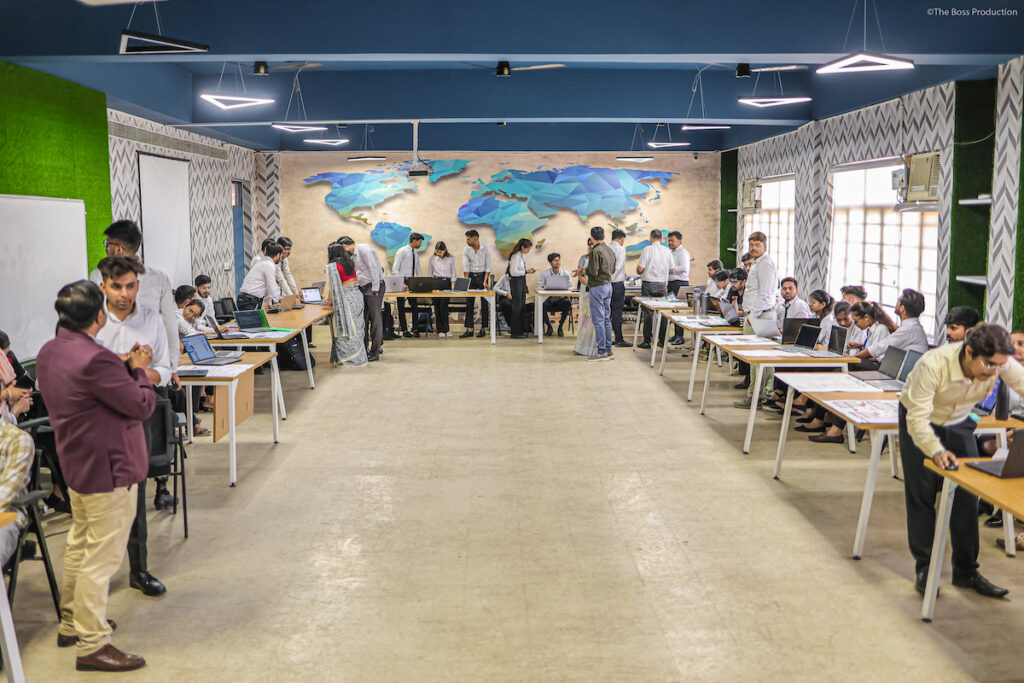Diploma in Pharmacy
A Diploma in Pharmacy (D.Pharm) is a two-year undergraduate program focused on preparing students for a career in the pharmaceutical industry.
This diploma course is designed to provide a comprehensive understanding of the fundamentals of pharmaceutical science, including the study of drug formulations, pharmacology, chemistry, and healthcare practices.
Key Aspects of D.Pharm:
Duration
The program typically lasts two years, divided into four semesters. Each semester includes both theoretical and practical components.
Curriculum
The curriculum covers subjects such as Pharmaceutics, Pharmacognosy, Pharmaceutical Chemistry, Human Anatomy & Physiology, Pharmacology, and Hospital & Clinical Pharmacy. The course also includes practical training in the formulation, dispensing, and analysis of drugs.
Eligibility
To enroll in a D Pharma course, candidates must have completed their higher secondary education (10+2) with Physics, Chemistry, and Biology or Mathematics as mandatory subjects. Some institutions may also require a minimum percentage in these subjects.
Career Opportunities
Graduates with a D.Pharm qualification, recognized as a registered pharmacy qualification, can pursue various roles in the pharmaceutical industry. These include positions as Pharmacists, Drug Inspectors, Medical Representatives, and opportunities to work in hospitals, community pharmacies, or pharmaceutical companies. With this registered pharmacy qualification, they are also eligible to open their own pharmacies after registering with the State Pharmacy Council.
Further Education
After completing a D.Pharm, students can opt to further their education by pursuing a Bachelor of Pharmacy (B.Pharm) or other specialized courses in pharmacy or related fields.
Licensing
D.Pharm graduates must register with the State Pharmacy Council to practice as registered pharmacist. This registration allows them to work in various healthcare settings, including hospitals, retail pharmacies, and clinics.
Importance of D.Pharm:
D.Pharm plays a crucial role in the healthcare sector by training individuals to become skilled healthcare professionals who contribute to the safe and effective use of medicines.
Pharmacists are key members of the healthcare team, ensuring that patients receive the correct medications and are educated on their proper use, whether through traditional settings or online pharmacies.
Their expertise ensures that both in-person and online pharmacy services provide safe, accurate, and reliable access to essential medications.
Some of the most opted courses in India and St. Andrews college or different Engineering college or Management colleges are as follows:-
- Btech
- Btech CSE
- Btech ETCE
- MTech
- BCA
- BBA
- MBA
- MCA
- DPharma – St. Andrews College of Pharmacy
- BPharma – St. Andrews College of Pharmacy
- BArch – St. Andrews College of Architecture
Eligibility Criteria for Diploma in Pharmacy (D.Pharm)

Educational Qualification:
- Candidates must have completed their higher secondary education (10+2) or equivalent.
- The qualifying examination should be passed with Physics, Chemistry, and Biology or Mathematics as mandatory subjects.
- Some institutions may also require a minimum percentage (generally around 45%-50%) in these subjects, though this can vary depending on the institution and the state regulations.
Age Limit:
- The candidate must be at least 17 years old at the time of admission. There is generally no upper age limit, but this can vary by institution.
Nationality:
- The candidate must be an Indian citizen. Some institutions may also offer admission to foreign nationals, subject to the approval of the concerned authorities.
Admission Process for Diploma in Pharmacy (D.Pharm)

Entrance Exam:
- Some states or institutions conduct entrance exams for admission into the D.Pharm program. These exams assess the candidate’s knowledge in subjects like Physics, Chemistry, Biology/Mathematics, and sometimes English.
- Popular entrance exams for D.Pharma include state-level exams like GPAT (Graduate Pharmacy Aptitude Test) and others specific to institutions.
Merit-Based Admission:
- Many institutions offer admission based on the candidate’s performance in the 10+2 examination. A merit list is prepared based on the marks obtained in the qualifying examination.
- Candidates with higher scores in Physics, Chemistry, and Biology/Mathematics are generally given preference.
Counseling:
- Some states or institutions conduct counseling sessions where students are allocated seats based on their rank in the entrance exam or their position in the merit list.
- During counseling, candidates may have the opportunity to choose their preferred college and course.
Application Process:
- Candidates must apply to the institutions offering D.Pharm by filling out their application forms, which can usually be obtained online or from the institution’s admission office.
- The application form requires personal details, academic qualifications, and any entrance exam details, if applicable.
- Application fees may need to be paid as part of the submission process.
Document Verification:
- After selection, candidates are required to provide original documents for verification. These typically include mark sheets, certificates, identity proof, and other relevant documents.
Final Admission:
- Once the documents are verified and the admission fee is paid, candidates are officially enrolled in the D.Pharma program.
Important Documents Required for Admission
- 10th and 12th mark sheets and passing certificates
- Entrance exam scorecard (if applicable)
- Transfer Certificate (TC) from the last attended institution
- Migration Certificate (for candidates from a different board or state)
- Character Certificate
- Passport-sized photographs
- Identity proof (Aadhaar Card, Passport, etc.)
- Caste Certificate (if applicable)
- Domicile Certificate (if applicable)
Diploma in Pharmacy Syllabus

The syllabus for the Diploma in Pharmacy (D.Pharm) program is generally divided into two academic years, each consisting of two semesters. The curriculum is designed to provide a comprehensive understanding of the pharmaceutical sciences, along with practical training.
Below is a typical semester-wise breakdown of the D.Pharm syllabus:
First Year (Semester I & II)
Semester I:
Pharmaceutics I: Introduction to Pharmacy, Dosage Forms, Prescription Writing, Pharmaceutical Calculations and Extraction and Preparation Methods
Pharmaceutical Chemistry I: Inorganic Pharmaceutical Chemistry, Acids, Bases, Buffers, Radio pharmaceuticals and Quality Control Tests
Pharmacognosy: Sources of Drugs, Study of Medicinal Plants, Adulteration of Drugs and Herbal Drugs
Biochemistry and Clinical Pathology: Carbohydrates, Proteins, Lipids, Enzymes, Vitamins, Blood Composition and Functions and Pathological Tests
Human Anatomy and Physiology: Structure and Function of Human Body, Circulatory System, Digestive System, Respiratory System, Nervous System
Health Education and Community Pharmacy: Health and Hygiene, First Aid, Nutrition and Health and Preventive Measures for Diseases
Semester II:
Pharmaceutics II: Pharmaceutical Formulations, Sterilization Methods, Containers and Closures and Extraction Techniques
Pharmaceutical Chemistry II: Organic Chemistry, Nomenclature of Organic Compounds, Chemical Reactions, Alcohols, Phenols, Ethers, Aldehydes, and Ketones
Pharmacology and Toxicology: General Pharmacology, Drugs Acting on the Central Nervous System, Autonomic Nervous System, Chemotherapy of Microbial Diseases and Toxicology
Pharmaceutical Jurisprudence: Pharmacy Act 1948, Drugs and Cosmetics Act 1940, Narcotic Drugs and Psychotropic Substances Act and Intellectual Property Rights (IPR) in Pharmacy
Hospital and Clinical Pharmacy: Hospital Pharmacy Organization, Drug Distribution System, Clinical Pharmacy Services, Drug Information Services and Patient Counseling
Drug Store and Business Management: Introduction to Management, Accountancy, Inventory Control, Salesmanship and Entrepreneurship Development
Second Year (Semester III & IV)
Semester III:
Pharmaceutics III: Pharmaceutical Technology, Unit Operations in Manufacturing, Quality Control of Pharmaceuticals and Packaging of Pharmaceuticals
Pharmaceutical Chemistry III: Medicinal Chemistry, Drugs Acting on Different Systems of the Body, Structure-Activity Relationship (SAR) and Drug Design and Development
Pharmacology II: Pharmacology of Endocrine System, Chemotherapy of Neoplastic Diseases, Immunopharmacology and Drugs Used in Respiratory Disorders
Pharmaceutical Analysis: Introduction to Pharmaceutical Analysis, Gravimetric Analysis, Titrimetric Analysis, Spectroscopic Techniques and Chromatographic Methods
Semester IV:
Hospital Pharmacy and Clinical Pharmacy II: Therapeutic Drug Monitoring, Clinical Research, Role of Pharmacist in Patient Care and Adverse Drug Reaction Reporting
Pharmacognosy II: Advanced Study of Natural Products, Alkaloids, Glycosides, Volatile Oils, Extraction and Isolation Techniques and Phytochemistry
Biochemistry II: Hormones and Enzymes, Metabolism of Carbohydrates, Lipids, Proteins, Biochemical Role of Vitamins and Genetic Code and Protein Synthesis
Pharmaceutical Microbiology: Microbial Classification and Identification, Sterilization Techniques, Microbial Contamination and Control, Antibiotic Sensitivity Testing and Immunology and Vaccines
Project Work/Industrial Training
- Students are usually required to undergo a practical training session in a hospital or pharmaceutical company.
- This may involve hands-on experience in various aspects of pharmacy, including drug formulation, dispensing, and patient interaction.
Practical Sessions:
In addition to the theoretical subjects, each semester includes practical sessions where students gain hands-on experience in laboratories, focusing on pharmaceutics, pharmaceutical chemistry, pharmacognosy, and other related subjects.
Career Scope and Job Profiles

After completing a Diploma in Pharmacy (D.Pharm), graduates have a wide range of career opportunities in the pharmaceutical and healthcare sectors. The diploma equips students with the necessary skills and knowledge to work in various roles within the industry.
Here’s an overview of the career scope and job profiles available to D.Pharm graduates:
Career Scope After D.Pharm
Community Pharmacy:
- Graduates can work as pharmacists in community or retail pharmacies. They are responsible for dispensing medications, providing drug information to patients, and advising on the safe use of prescription and over-the-counter drugs.
Hospital Pharmacy:
- D.Pharm holders can work in hospital pharmacies, where they manage the dispensing of medications to inpatients and outpatients, collaborate with healthcare professionals, and ensure the proper use of drugs within the hospital setting.
Pharmaceutical Industry:
- There are opportunities in pharmaceutical manufacturing, quality control, production, and packaging. Graduates can work in roles such as production supervisor, quality analyst, or packaging supervisor.
Sales and Marketing:
- D.Pharm graduates can pursue careers within the pharmacy profession as medical representatives (MR) or in pharmaceutical sales and marketing. They are responsible for promoting and selling pharmaceutical products to healthcare professionals and pharmacies, playing a vital role in the pharmacy profession by ensuring that healthcare providers have access to the latest medications and treatments.
Government Jobs:
- Opportunities are available in government sectors, such as working as a pharmacist in government hospitals, health departments, or drug control organizations. Graduates can also appear for various government exams for higher posts.
Regulatory Affairs:
- Graduates can work in regulatory affairs, ensuring that pharmaceutical products comply with all the regulations and laws governing the industry.
Entrepreneurship:
- After registering with the State Pharmacy Council, D.Pharm graduates can open their own retail or wholesale pharmacy, offering services directly to the public.
Further Studies:
- Graduates can continue their education by pursuing a Bachelor of Pharmacy (B.Pharm) or other advanced degrees in pharmacy. This opens up further opportunities in research, academia, and specialized fields.
Job Profiles After D.Pharm
Pharmacist:
- Primary role in retail, hospital, or community pharmacies.
- Responsible for dispensing medications, advising patients, and managing the inventory of pharmaceuticals.
Medical Representative (MR):
- Works in sales and marketing, promoting pharmaceutical products to healthcare professionals.
- Requires strong communication and negotiation skills.
Pharmacy Technician:
- Assists pharmacists in preparing and dispensing medications, maintaining patient records, and managing pharmacy inventory.
Quality Control (QC) Analyst:
- Ensures the quality and safety of pharmaceutical products by conducting tests and inspections during the production process.
Production Executive:
- Manages the production of pharmaceutical products in manufacturing units, ensuring that processes adhere to quality standards.
Pharmaceutical Sales Executive:
- Involves the sale and distribution of pharmaceutical products to retail pharmacies, hospitals, and clinics.
Drug Inspector:
- A government position responsible for inspecting the quality, safety, and labeling of drugs produced or sold in the market.
Hospital Pharmacist:
- Works in hospital settings, collaborating with medical staff to manage medication therapy for patients and ensuring the safe administration of drugs.
Clinical Research Associate:
- Involved in clinical trials and research studies, monitoring and documenting the effects of new drugs and treatments.
Entrepreneur:
- Operates own pharmacy business, providing a range of pharmaceutical products and healthcare services to the community.
Salary Expectations
- Entry-Level: Starting salaries typically range from ₹2.5 lakhs to ₹4 lakhs per annum, depending on the job profile and location.
- Experienced Professionals: With experience, pharmacists and other professionals can earn higher salaries, ranging from ₹4 lakhs to ₹6 lakhs per annum or more.
- Entrepreneurs: Income can vary significantly based on the success and scale of the business.
Future Prospects
The demand for healthcare services is continually growing, leading to an increased need for qualified pharmacy professionals. With advancements in the pharmaceutical industry and the ongoing development of new drugs and therapies, the career scope for D.Pharm graduates is expected to expand further, offering stability and growth in the long term.
Top Diploma Pharmacy Colleges in India

Here are some of the top colleges in India that offer a Diploma in Pharmacy (D.Pharm):
Jamia Hamdard, New Delhi
- Location: New Delhi
- Overview: Jamia Hamdard is renowned for its pharmacy programs and offers a comprehensive D.Pharm course. The institution is well-equipped with modern facilities and has a strong emphasis on research and development.
- Affiliation: Jamia Hamdard University
- Accreditation: NAAC ‘A’ Grade
St. Andrews College of Pharmacy (SACP), Gurgaon
- Location: Gurgaon, Haryana
- Overview: SACP is one of the leading pharmacy institutions in India. It offers a robust D.Pharm program with state-of-the-art facilities.
- Affiliation: Pharmacy Council of India (PCI), Haryana State Board of Technical Education (HSBTE)
Delhi Institute of Pharmaceutical Sciences and Research (DIPSAR), New Delhi
- Location: New Delhi
- Overview: DIPSAR is a prestigious institution that focuses on pharmaceutical education and research. It has a strong reputation for providing quality education in the field of pharmacy.
- Affiliation: Delhi Pharmaceutical Sciences and Research University (DPSRU)
- Accreditation: PCI (Pharmacy Council of India)
Institute of Chemical Technology (ICT), Mumbai
- Location: Mumbai, Maharashtra
- Overview: ICT Mumbai is a premier institution for chemical technology and pharmacy. The D.Pharm program here is well-recognized for its rigorous curriculum and excellent faculty.
- Affiliation: Deemed University
- Accreditation: NAAC ‘A++’ Grade
Madras Medical College (MMC), Chennai
- Location: Chennai, Tamil Nadu
- Overview: MMC is one of the oldest medical institutions in India, offering a well-established D.Pharm program. The college has a strong focus on clinical pharmacy and healthcare.
- Affiliation: The Tamil Nadu Dr. M.G.R. Medical University
- Accreditation: PCI
Government College of Pharmacy, Bengaluru
- Location: Bengaluru, Karnataka
- Overview: This government-run institution is known for its quality education in pharmacy. The D.Pharm program is highly regarded, and the college has good industry connections.
- Affiliation: Rajiv Gandhi University of Health Sciences (RGUHS)
- Accreditation: PCI
JSS College of Pharmacy, Ooty
- Location: Ooty, Tamil Nadu
- Overview: JSS College of Pharmacy is a part of the JSS Academy of Higher Education & Research. It is known for its strong academic curriculum and excellent infrastructure.
- Affiliation: JSS Academy of Higher Education & Research
- Accreditation: PCI, AICTE
L.M. College of Pharmacy, Ahmedabad
- Location: Ahmedabad, Gujarat
- Overview: One of the oldest pharmacy colleges in Gujarat, L.M. College of Pharmacy offers a well-rounded D.Pharm program with strong emphasis on practical learning.
- Affiliation: Gujarat Technological University (GTU)
- Accreditation: PCI
Amrita School of Pharmacy, Kochi
- Location: Kochi, Kerala
- Overview: Part of Amrita Vishwa Vidyapeetham, this college is known for its holistic approach to pharmaceutical education. The D.Pharm program here is highly reputed.
- Affiliation: Amrita Vishwa Vidyapeetham
- Accreditation: PCI
Al-Ameen College of Pharmacy, Bengaluru
- Location: Bengaluru, Karnataka
- Overview: Al-Ameen College of Pharmacy is one of the leading private pharmacy colleges in India. It has a strong D.Pharm program with good industry exposure and practical training.
- Affiliation: Rajiv Gandhi University of Health Sciences (RGUHS)
- Accreditation: PCI, AICTE
Diploma in Pharmacy Course Fees

The fees for a Diploma in Pharmacy (D.Pharm) can vary significantly depending on the type of institution (government or private), location, and the facilities provided.
Below is a general overview of the fee structure for D.Pharm courses in India:
Government Colleges
- Average Fees: ₹5,000 to ₹50,000 per year
- Government colleges tend to have lower fees compared to private institutions due to subsidies provided by the government. These colleges offer quality education at an affordable cost, making them a popular choice among students.
Private Colleges
- Average Fees: ₹50,000 to ₹2,00,000 per year
- Private institutions generally have higher fees due to better infrastructure, advanced facilities, and sometimes more personalized education. The fees can vary widely depending on the reputation of the institution and the facilities offered.
Deemed Universities
- Average Fees: ₹1,00,000 to ₹3,00,000 per year
- Deemed universities, which often provide more advanced facilities and a broader range of extracurricular activities, tend to have higher fees. These institutions may also offer scholarships or financial aid to deserving students.
Autonomous Colleges
- Average Fees: ₹60,000 to ₹1,50,000 per year
- Autonomous colleges, which have the authority to set their curriculum and fees, often charge in the mid to high range depending on the quality of education and infrastructure.
Additional Costs:
- Examination Fees: Usually between ₹1,000 to ₹5,000 per year.
- Books and Supplies: Approximately ₹5,000 to ₹15,000 per year, depending on the college and the resources provided.
- Hostel Fees: If applicable, can range from ₹20,000 to ₹1,00,000 per year, depending on the facilities provided.
Top Recruiters with great Salary Packages for D.Pharma

Graduates of a Diploma in Pharmacy (D.Pharm) can find employment across various sectors of the pharmaceutical and healthcare industries.
Numerous companies, both in the private and public sectors, actively recruit D.Pharm graduates, offering competitive pharma salary packages.
These opportunities allow graduates to work in roles that are critical to the effective functioning of the pharmaceutical industry, ensuring they are well-compensated for their expertise and contribution to healthcare.
Below are some of the top recruiters known for providing great salary packages to D.Pharm graduates:
Top Recruiters in India
Apollo Pharmacy
- Sector: Retail Pharmacy
- Overview: Apollo Pharmacy is one of the largest pharmacy chains in India, offering a wide range of career opportunities for D.Pharm graduates.
- Salary Package: ₹2.5 lakhs to ₹4.5 lakhs per annum (Entry-Level)
MedPlus
- Sector: Retail Pharmacy
- Overview: MedPlus is another leading pharmacy chain in India, known for its extensive network and customer-centric services.
- Salary Package: ₹2.5 lakhs to ₹4 lakhs per annum (Entry-Level)
Cipla
- Sector: Pharmaceutical Manufacturing
- Overview: Cipla is a global pharmaceutical company, well-regarded for its focus on innovation and high-quality healthcare products.
- Salary Package: ₹3 lakhs to ₹5 lakhs per annum (Quality Control, Production roles)
Sun Pharmaceutical Industries
- Sector: Pharmaceutical Manufacturing
- Overview: Sun Pharma is one of the largest pharmaceutical companies in India, offering opportunities in production, quality control, and sales.
- Salary Package: ₹3 lakhs to ₹6 lakhs per annum (Quality Assurance, Production roles)
Dr. Reddy’s Laboratories
- Sector: Pharmaceutical Manufacturing
- Overview: Dr. Reddy’s is a global pharmaceutical company with a strong presence in both domestic and international markets.
- Salary Package: ₹3 lakhs to ₹6 lakhs per annum (Quality Control, Production, Regulatory Affairs)
Aurobindo Pharma
- Sector: Pharmaceutical Manufacturing
- Overview: Aurobindo Pharma is a leading pharmaceutical company that recruits D.Pharm graduates for various roles in manufacturing, quality control, and sales.
- Salary Package: ₹2.5 lakhs to ₹5 lakhs per annum (Entry-Level roles)
Fortis Healthcare
- Sector: Hospital Pharmacy
- Overview: Fortis Healthcare is a major healthcare provider in India, offering roles in hospital pharmacies where pharmacists play a crucial role in patient care.
- Salary Package: ₹3 lakhs to ₹4.5 lakhs per annum (Hospital Pharmacist)
Ranbaxy Laboratories
- Sector: Pharmaceutical Manufacturing
- Overview: Now a part of Sun Pharma, Ranbaxy offers diverse opportunities for D.Pharm graduates in various roles, especially in quality control and production.
- Salary Package: ₹3 lakhs to ₹5 lakhs per annum
Glenmark Pharmaceuticals
- Sector: Pharmaceutical Manufacturing
- Overview: Glenmark Pharmaceuticals is known for its strong research and development capabilities and offers rewarding careers for D.Pharm graduates.
- Salary Package: ₹3 lakhs to ₹5 lakhs per annum
Reliance Wellness
- Sector: Retail Pharmacy
- Overview: Part of Reliance Industries, Reliance Wellness operates retail pharmacies and wellness centers, providing employment opportunities across India.
- Salary Package: ₹2.5 lakhs to ₹4 lakhs per annum
Government Sector Opportunities
D.Pharm graduates can also pursue careers in the government sector, where salaries are often determined by government pay scales. Positions in government hospitals, health departments, and regulatory bodies like the Drug Controller General of India (DCGI) offer job security and benefits.
- Government Pharmacist: ₹3 lakhs to ₹5 lakhs per annum (depending on the pay scale and state)
- Drug Inspector: ₹6 lakhs to ₹8 lakhs per annum (requires additional qualifications or exams)
Entrepreneurship
- Own Pharmacy Business: Potential earnings can vary widely based on the scale and location of the business but can be significantly higher than salaried roles.
Salary Growth and Prospects
- Entry-Level: ₹2.5 lakhs to ₹4.5 lakhs per annum
- Mid-Level (5-10 years of experience): ₹4 lakhs to ₹7 lakhs per annum
- Senior-Level (10+ years of experience): ₹7 lakhs to ₹12 lakhs per annum or higher, depending on the role and company
Career Advancement and Specialization

A Diploma in Pharmacy (D.Pharm) is a foundational qualification that offers various career advancement opportunities and specialization paths. After completing D.Pharm, graduates can enhance their careers by pursuing higher education, gaining certifications, or specializing in specific areas within the pharmaceutical industry.
Here’s an overview of the career advancement and specialization options available:
1. Higher Education
Bachelor of Pharmacy (B.Pharm)
- Overview: Pursuing a Bachelor of Pharmacy (B.Pharm) is one of the most common pathways for D.Pharm graduates. It’s a 3-year program (lateral entry) that builds on the knowledge acquired during the D.Pharm course.
- Advantages: B.Pharm graduates have broader career opportunities, including roles in research, regulatory affairs, quality control, and higher positions in pharmaceutical companies.
- Specializations: After B.Pharm, graduates can specialize further through M.Pharm or other postgraduate programs.
Master of Pharmacy (M.Pharm)
- Overview: After B.Pharm, students can opt for an M.Pharm, a 2-year postgraduate program with various specializations like Pharmacology, Pharmaceutics, Pharmacognosy, Pharmaceutical Chemistry, and more.
- Advantages: M.Pharm graduates are often considered for research roles, teaching positions, and higher management roles in the pharmaceutical industry.
Pharm.D (Doctor of Pharmacy)
- Overview: Pharm.D is a 6-year integrated program (including an internship) that focuses on clinical pharmacy, patient care, and advanced pharmacology.
- Advantages: Pharm.D graduates are qualified to work as clinical pharmacists in hospitals, healthcare settings, and even pursue a career in academia.
MBA in Pharmaceutical Management
- Overview: Combining a pharmaceutical background with a management degree can lead to roles in pharmaceutical marketing, sales, management, and business development.
- Advantages: This combination is highly valued for leadership positions in pharmaceutical companies, healthcare organizations, and related industries.
2. Certification Courses
Clinical Research
- Overview: Certification in clinical research can open doors to careers in clinical trials, research organizations, and pharmaceutical companies.
- Advantages: Provides specialized knowledge in conducting and managing clinical trials, which is essential for drug development.
Pharmacovigilance
- Overview: Pharmacovigilance involves monitoring the safety of drugs after they have been released to the market. Certification in this field can lead to roles in drug safety and regulatory affairs.
- Advantages: Highly specialized field with increasing demand due to the focus on drug safety.
Regulatory Affairs
- Overview: Certification in regulatory affairs equips professionals with knowledge about the regulations governing pharmaceuticals and healthcare products.
- Advantages: This specialization is essential for careers in compliance, regulatory submissions, and ensuring products meet legal standards.
Quality Control and Assurance
- Overview: Quality control and assurance certifications focus on maintaining the standards of pharmaceutical products throughout the production process.
- Advantages: Critical for roles in manufacturing, production, and quality assurance departments in pharmaceutical companies.
3. Specialization Areas After D.Pharm
Hospital Pharmacy
- Overview: Specializing in hospital pharmacy involves focusing on patient care, medication management, and working closely with healthcare professionals.
- Advantages: Offers a stable and rewarding career within healthcare institutions.
Community Pharmacy
- Overview: Specializing in community pharmacy means working directly with the public, providing medications, and offering healthcare advice.
- Advantages: Opportunities for entrepreneurship by opening and managing a retail pharmacy.
Industrial Pharmacy
- Overview: Involves working in the manufacturing sector of the pharmaceutical industry, focusing on drug production, formulation, and packaging.
- Advantages: Opportunities to work in pharmaceutical manufacturing plants and production units.
Clinical Pharmacy
- Overview: Clinical pharmacy focuses on direct patient care, optimizing medication use, and ensuring effective drug therapy.
- Advantages: A growing field with opportunities in hospitals, healthcare settings, and research institutions.
Research and Development (R&D)
- Overview: Specializing in R&D involves working on the development of new drugs, conducting trials, and innovating new pharmaceutical formulations.
- Advantages: High potential for career growth and contribution to pharmaceutical advancements.
4. Government Jobs and Competitive Exams
Drug Inspector
- Overview: Drug Inspectors are responsible for ensuring the quality and safety of drugs sold in the market. This role requires passing competitive exams conducted by state or central governments.
- Advantages: Offers job security, good salary, and the opportunity to play a crucial role in public health.
Government Pharmacist
- Overview: Government pharmacists work in public hospitals, health departments, and other government-run healthcare institutions.
- Advantages: Secure job with a fixed pay scale and benefits, including opportunities for further promotions.
Pharmacist in Armed Forces
- Overview: The Indian Army, Navy, and Air Force recruit pharmacists to manage drug supplies and patient care in military hospitals.
- Advantages: Prestigious career with good benefits and the opportunity to serve the country.
5. Entrepreneurship and Business Opportunities
Opening a Pharmacy
- Overview: D.Pharm graduates can start their own retail or wholesale pharmacy, providing medications and healthcare products to the public.
- Advantages: Being your own boss with the potential for high earnings based on business success.
Pharmaceutical Distribution
- Overview: Involves setting up a business that deals with the distribution of pharmaceutical products to retailers, hospitals, and clinics.
- Advantages: Lucrative business with growth potential, especially in regions with high demand.
Benefits of Pursuing Diploma in Pharmacy Course

Pursuing a Diploma in Pharmacy (D.Pharm) offers several benefits, especially for those looking to enter the pharmaceutical and healthcare industries.
Here are some key advantages of pursuing a D.Pharm course:
Quick Entry into the Pharmaceutical Industry
- Duration: The D.Pharm program is typically a two-year course, making it a relatively short route to starting a career in the pharmaceutical industry.
- Early Employment: Graduates can quickly enter the workforce and begin earning, often taking on roles such as pharmacists, medical representatives, or pharmacy technicians.
Strong Demand for Pharmacists
- Healthcare Growth: The demand for healthcare services is rising, leading to a growing need for qualified pharmacists in various settings, including hospitals, retail pharmacies, and pharmaceutical companies.
- Job Security: With the increasing focus on healthcare, a career in pharmacy offers good job security.
Foundation for Further Education
- Stepping Stone: D.Pharm serves as an excellent foundation for further studies, such as a Bachelor of Pharmacy (B.Pharm), Master of Pharmacy (M.Pharm), or even a Doctor of Pharmacy (Pharm.D).
- Career Advancement: Higher education can lead to more specialized roles, higher salaries, and opportunities in research, regulatory affairs, and academia.
Versatile Career Opportunities
- Diverse Roles: D.Pharm graduates can explore various career paths, including roles in hospital pharmacies, community pharmacies, pharmaceutical sales, manufacturing, quality control, and regulatory affairs.
- Flexibility: The qualification allows flexibility in choosing the type of work environment, whether it’s in healthcare settings, corporate environments, or self-employment.
Opportunity for Entrepreneurship
- Own Pharmacy: With a D.Pharm qualification and registration with the State Pharmacy Council, graduates can open and run their own retail or wholesale pharmacy, offering medications and healthcare products to the community.
- Business Potential: Running a pharmacy can be a profitable business, providing both financial independence and the ability to serve the community.
Contribution to Public Health
- Healthcare Role: Pharmacists play a crucial role in the healthcare system by ensuring the safe and effective use of medications, educating patients, and supporting overall public health.
- Patient Interaction: D.Pharm graduates have the opportunity to directly interact with patients, advising them on the proper use of medications and helping to manage their health.
Wide Recognition and Accreditation
- Regulatory Recognition: The D.Pharm qualification is widely recognized and regulated by the Pharmacy Council of India (PCI), ensuring that the curriculum meets industry standards.
- Professional License: Graduates are eligible to obtain a professional license to practice as registered pharmacists, a recognized and respected credential in the healthcare industry.
Financial Benefits
- Affordable Education: Compared to many other professional courses, D.Pharm programs are often more affordable, especially in government institutions, making it accessible to a wider range of students.
- Good Starting Salary: D.Pharm graduates typically start with competitive salaries, and with experience, the potential for earning increases significantly.
Practical Skills and Training
- Hands-On Learning: The D.Pharm curriculum includes practical training in laboratories, hospitals, and community settings, equipping students with the hands-on skills needed for real-world applications.
- Clinical Experience: Students gain valuable experience in drug formulation, dispensing, patient counseling, and managing pharmacy operations, which are critical for career success.
Scope for Government Jobs
- Public Sector Employment: D.Pharm graduates can apply for various government jobs, such as positions in public hospitals, health departments, and drug control organizations, which offer job security and additional benefits.
- Competitive Exams: The diploma also qualifies graduates to appear for competitive exams for roles like Drug Inspector, which offer higher pay scales and job stability.
Increasing Career Prospects with Healthcare Expansion
- Healthcare Reforms: With ongoing healthcare reforms and an aging population, the need for well-trained pharmacy professionals is expected to grow, providing long-term career prospects.
- Global Opportunities: The skills and knowledge acquired in a D.Pharm course are transferable, allowing graduates to explore job opportunities abroad in countries with a demand for qualified pharmacists.
FAQs
What is a pharmacy diploma?
A pharmacy diploma, such as the Diploma in Pharmacy (D.Pharm), is a two-year program designed to equip students with essential knowledge and skills in pharmaceutical sciences.
This form diploma program covers topics like pharmacology, medicinal chemistry, and pharmacy practice, along with practical training in dispensing medications and managing pharmacy operations.
Upon completion, graduates can pursue careers as pharmacists, work in pharmaceutical companies, or even open their own pharmacies. The program serves as a foundational qualification for those seeking to enter the pharmacy profession, offering a blend of theoretical knowledge and hands-on experience.
Which diploma is best for pharmacist?
The Diploma in Pharmacy (D.Pharm) is considered the best diploma for aspiring pharmacists. This two-year program provides a strong foundation in pharmaceutical sciences and pharmacy practices, covering essential topics like pharmacology, medicinal chemistry, and drug formulation.
It also includes practical training, enabling students to gain hands-on experience in dispensing medications, managing pharmacy operations, and ensuring patient safety. Graduates of the D.Pharm program are well-prepared to work as pharmacists in hospitals, community pharmacies, or pharmaceutical companies.
The curriculum is specifically designed to equip students with the knowledge and skills needed for effective pharmacy practices in various healthcare settings.
What is the D pharmacy course salary?
The salary for individuals who have completed a D.Pharm course can vary based on experience, location, and the type of employment. Graduates from reputable pharmacy schools can expect an entry-level salary ranging from ₹2.5 to ₹4 lakhs per annum in India.
With experience, this can increase to ₹6 lakhs or more annually. Those working in metropolitan areas or with large pharmaceutical companies may earn higher salaries. Additionally, owning a pharmacy or gaining specialized roles can significantly boost earnings.
The salary is influenced by the reputation of the pharmacy school and the opportunities it provides for practical experience.
Can I do D pharmacy programme after 10th?
No, you cannot directly pursue a D.Pharm course after completing the 10th grade. To enroll in a Diploma in Pharmacy (D.Pharm) program, you must have completed your 12th grade with a focus on science subjects, including Physics, Chemistry, and either Biology or Mathematics.
This requirement ensures that students have the necessary foundation in science before starting their pharmacy education.
After completing the 12th grade, you can apply for D.Pharm, which is the first step towards a pharmacy career, leading to opportunities in various roles within the pharmaceutical industry and healthcare sector.
Are there any entrance exams for Diploma in Pharmacy?
Yes, some states and institutions conduct entrance exams like GPAT, CET, or other state-level exams for admission to the D.Pharm course.
What are the career opportunities after completing a Diploma in Pharmacy?
Graduates can work as pharmacists in hospitals, community pharmacies, pharmaceutical companies, and healthcare institutions. They can also pursue further studies, such as a Bachelor of Pharmacy (B.Pharm).
What is the average salary after completing a Diploma in Pharmacy?
The average starting salary for D.Pharm graduates ranges from ₹2.5 to ₹4 lakhs per annum, depending on the job role and location.




